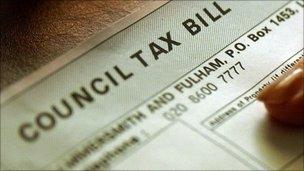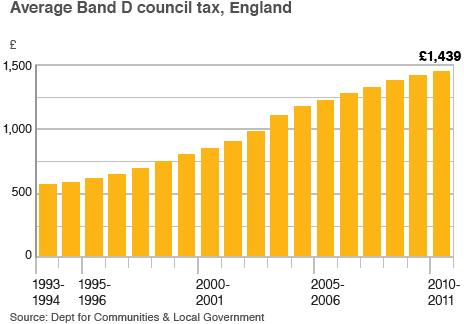Public to be given power to veto council tax bills
- Published

Ministers argue council tax increases over the Labour years were unacceptably high
The public will be able to veto council tax increases in England above an agreed limit, Communities Secretary Eric Pickles has said.
Mr Pickles wants to give communities the "final say" over council tax bills by voting on them in referendums.
By 2012, he wants people to be able to reject bill levels if they exceed a ceiling agreed annually by MPs.
Labour said it had already reduced increases to their lowest levels and there was no need for referendums.
But Mr Pickles said councils could have to refund taxpayers in what he will call a "radical extension of direct democracy".
He told BBC Radio 4's Today programme: "We think it's important, as part of the 'big society', for decisions to be taken locally."
Mr Pickles added that he was "in favour of local people making local decisions".
Ministers will launch a consultation on the proposals later, with a view to putting legislation before Parliament next year.
They are also set to ask the Welsh Assembly government whether it should adopt the new council tax measure.
'Proving the case'
In Scotland and Northern Ireland it is a matter for their devolved administrations.
Later, Mr Pickles is expected to argue Labour's policy of capping excessive council tax increases has not always deterred councils and has excluded residents from decision-making.
He will say he wants to reverse "the presumption" that central government knows best when it comes to deciding local priorities and also wants to make councils more accountable to their constituents for their budgetary planning.
"If councils want to increase council tax further, they will have to prove the case to the electorate," he will say. "Let the people decide."
Under the proposals, any local authority setting council tax - using bills for Band D properties as a benchmark - above a threshold agreed by Parliament would automatically trigger a referendum of all registered voters in the area.
Residents will be asked to choose between the proposed amount and an alternative which would keep bills below the defined limit.
If a majority of voters rejected the council's planned charges, local authorities could have to refund taxpayers in some way.
But with referendums likely to be held on the same day as council elections - in order to save costs - this could mean higher bills had already come into effect and rebates would only be paid retrospectively.
'Radical'
Mr Pickles will say the process will mean councils will know where they stand, unlike under the current capping system, and cut down on expensive re-billing.
"Power should not just be given to councils but be devolved further down to neighbourhoods and citizens," he will say.

The number of councils seeing their rates capped has fallen in recent years.
Between 2004 and 2006, 13 were targeted but none has been since.
But action has increasingly been taken against police authorities, whose budgets are partly funded by council tax, and the new veto powers will also extend to them.
Government figures show average bill rises under Labour peaked at close to 13% in 2003-04 but have fallen significantly since then, with bills set to rise 1.7% this year.
The coalition has said it will seek to freeze council tax in England for a year and change the system of local government finance to give authorities more control over their budgets in return for more openness about spending decisions.
Funding cuts
However, critics say the referendum proposal is designed to distract ffrom the fact that local government services are going to be severely damaged by cuts in central government budgets of between 25% and 40%.
Shadow secretary of state for communities and local government John Denham said: "Eric Pickles is already making council tax payers pay over the odds for local services.
"The cut of over £1bn he has forced on English councils this year means everyone is paying more for lower levels of service than they got last year.
"Labour had already reduced council tax increases to their lowest ever levels and it is years since any council needed to be capped.
"His referendum is claiming to solve a problem that need not exist."
Last month Mr Pickles said central funding for councils would be cut by £1.166bn but no local authority would face cuts in its block grant of more than 2%.
Campaign group Unlock Democracy called Mr Pickles's referendum plan a "welcome first step" but it was only a "halfway house" to full local democratic control.
Director Peter Facey said: "It should be left to local people to trigger a referendum at any level if they can raise a petition with the signatories of 5% of registered voters.
"At present these proposals do not fully empower citizens and communities but just substitute one form of central control with another."
- Published30 July 2010
- Published5 June 2010
- Published31 May 2010
- Published18 June 2010